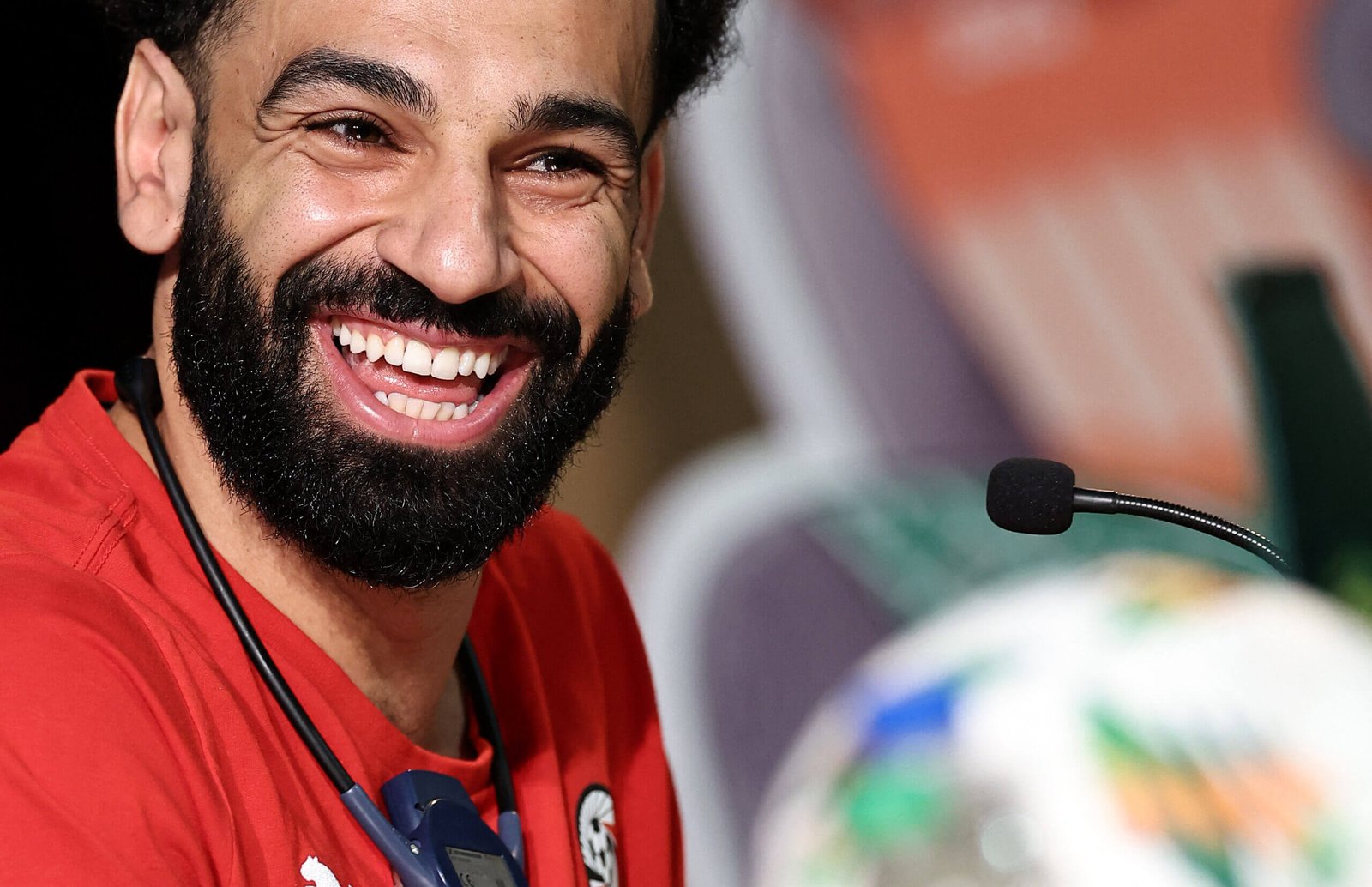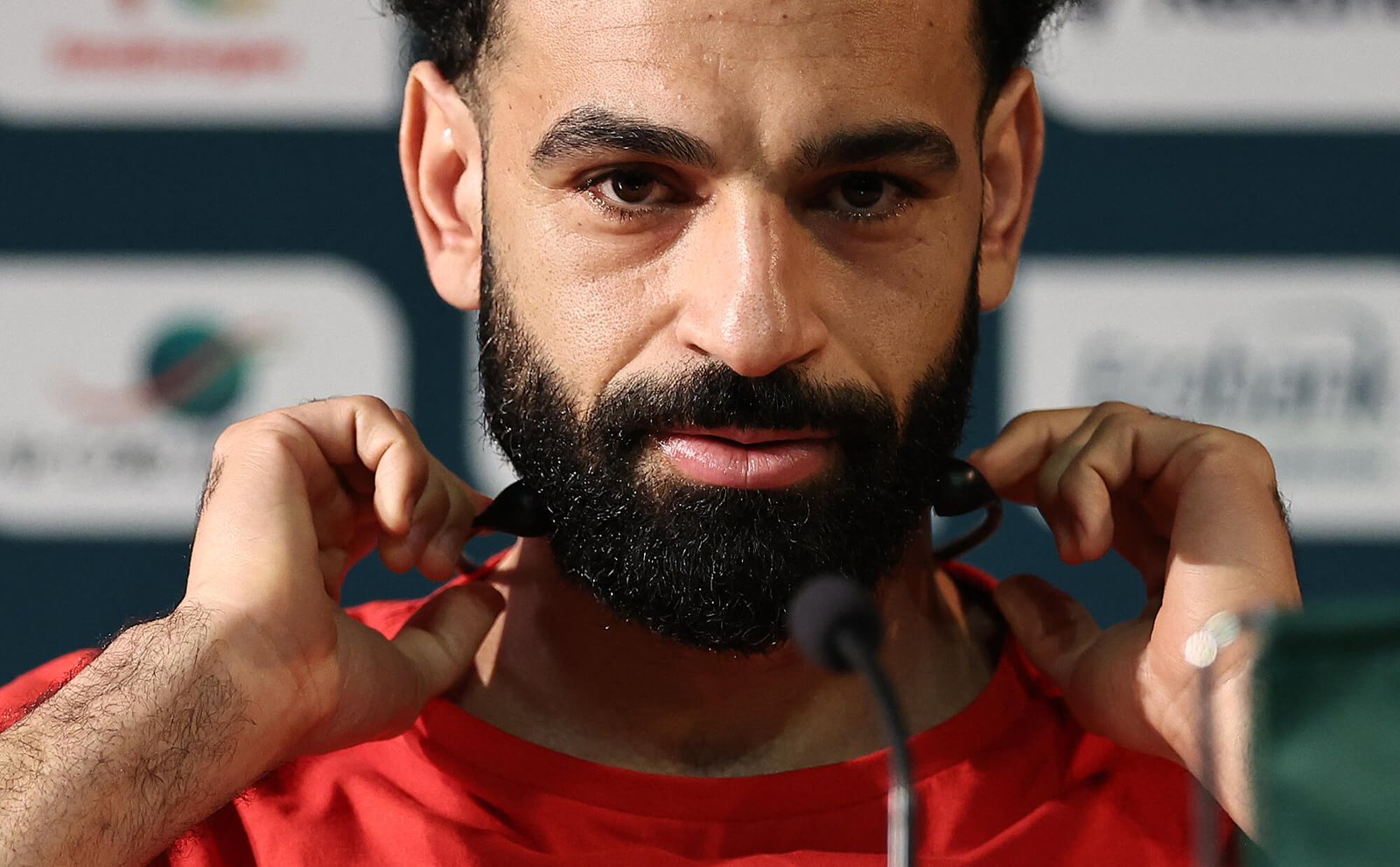Early on Saturday evening, there was a flurry of messages between journalists based in Abidjan after an intriguing email was circulated by CAF (Confederation of African Football), the organisers of AFCON 2023.
Mohamed Salah, the Egyptian national team captain, was to give a press conference at the Palais de la Culture in the Ivorian capital.
This is news in itself. Salah, after all, rarely speaks to the media. At Liverpool, he has engaged just once in a collective setting and that was nearly six years ago after he smashed through the 40-goal barrier during his first season at the club. The conversation lasted less than four minutes.
Salah is arguably the most famous footballer in Africa. Yet he picks and chooses his words carefully on those sporadic occasions he puts himself forward.
Many of the captains representing the other nations in this tournament have taken up press responsibilities ahead of the first two group games.
Yet when Egypt faced Mozambique, Mostafa Mohamed accompanied the coach, Rui Vitoria. And ahead of the next fixture, it was Al Ahly goalkeeper Mohamed El Shenawy.
Perhaps Salah had figured Egypt will go deep into the competition and this would mean more opportunities for him to speak than captains from some of the other nations.
Yet he is now injured, missing at least two games. And back in Egypt, he has faced ferocious criticism from some of the loudest and most outspoken pundits. Ibrahim Said, a two-time AFCON winner turned controversialist commentator, has even cast doubts over Salah’s commitment to Egypt, claiming he cares more about Liverpool.
Salah lies injured against Ghana (Issouf Sanogo/AFP via Getty Images)
There is no foundation for these claims. But it is amidst this hysteria, that Salah is trying to rehabilitate his sore hamstring, even though Egypt will be going home if they do not secure at least a point against Cape Verde tomorrow night.
The Egyptian Football Association figured that most of the questions ahead of Cape Verde would be about Salah, so he might as well answer them himself. His presence was a show of strength, indicating that he will recover from his injury and play again for Egypt if they negotiate the next two games.
The setting was appropriately starry. The Palais de la Culture was financed by China in 1999 and is modelled on the Sydney Opera House. It is considered Abidjan’s number one live venue for local bands and comedians, and has hosted globally renowned musicians such as Wyclef Jean.
Salah’s journey from Hotel Tiama, Egypt’s team base, across the bridge that joins Triechville with Plateau took 15 minutes. He was sitting on a long table beside the tournament’s mascot, an elephant called “Akwaba,” which translates simply as “welcome.”
After the conclusion of a press conference for Nigeria, the media officer from CAF announced that Salah was coming but Vitoria was referred to simply as “the coach.”
It was clear who the star attraction was. Yet the press was also told that no questions would be accepted about Salah’s condition in terms of what it might mean for Liverpool. “This is a tournament for Africa,” he suggested.
The Athletic has decided to run the dialogue that followed in full, in an effort to convey the pressure Salah faces, as well as how he handles it. He was friendly, positive and convincing. When Vitoria was asked whether he would leave his post if Egypt failed tomorrow, Salah intervened: “Continue, continue!”
Only at the last question, when he was asked about whether he thought the Egyptian team was better without him, did he become more combative.
CAF media officer: Mohamed, how are you feeling?
Salah: First of all, I’m happy to be here. But my injury is still there. It is most important to speak about the game. We have great players and a great team. We just need to fight and see what happens. It’s the best 19 players playing from Egypt, and 27 in total; we need to play with courage and confidence. I believe we’re going to win the game.
Journalist: Egypt has come close to winning the last couple of editions of this competition. How important is it to win AFCON and will you come back to try and win it again?
Salah: I think everyone knows what it means to win the AFCON. We are proud to wear the t-shirt. We were unlucky in the last one (when Egypt lost the final on penalties to Senegal in Cameroon) , and before that in Gabon. We are very motivated, all of us.
But we have a fantastic team with a great coach. We have to stay positive. Two years ago, we finished first in the group and then faced the favourites in each of the rounds (Ivory Coast, Cameroon and Senegal). If we qualify second, it might not be the same.
Journalist: The Algerian and Egyptian teams (from North Africa) have failed to win so far. Have climate factors impacted the team’s performances?
Salah: Climate can impact everyone. We are trying to adapt and embrace the occasion before us. Unfortunately we have drawn the games. We know the conditions in Africa. We also have professional players who take into account these aspects. There is a pressure on all the teams.
As professionals, we should leave aside the climate factor and focus on the objective to achieve. It should not be our main concern. Climate is not the main factor. We want to win and qualify for the next stage of competition.

Salah in his press conference (Franck Fife/AFP via Getty Images)
Journalist: How do you assess the quality of play so far?
Salah: It’s very tricky for the teams that are considered the best. The levels are very close. You go to the game and you don’t know who is going to win. Football is improving a lot. Players are playing in Europe a lot in the big levels. You can see in the World Cup, Morocco went so far and all of Africa was behind them.
Journalist: You are one of the best players in the world. Do you feel the pressure of the Egyptian public?
Salah: I would not say our performances have been bad. It has not been easy for any player. It is about the team, not one player. The ball is for everyone. Our objective is to go as far as possible in this tournament. I would love to win it. Absolutely, I would love to win. It. It will happen somehow, I believe. What I believe, I achieve. Sooner or later it will happen.
Journalist: How do you respond to the criticism of the team in Egypt?
Salah: I hear the criticism. When we lose a match people are very critical. I believe in my team and I believe in the players. I think we will continue to improve on our performance. It is true that I am the captain but I wish people would be more flexible and realise players are giving their best, even if the outcome is different to what is expected.
I ask the supporters to get behind the team. Football is not easy. We have some players participating in the tournament for the first time. Pressure is not on the supporters but it is on us as players. We are open to criticism. But as professionals, we know what is expected on the field. I respect all opinions. I do my best but I don’t take into account what is being said on social media.
Journalist: Some people have been saying the Egyptian team is freer when Salah is not around, like in the second half against Ghana when the team scored twice. Could your presence be an obstacle?
Salah: I don’t believe my presence puts extra pressure on the players. It is not mandatory to play with Mohamed Salah. Any player can be replaced and the others will improve open performance but it doesn’t mean that player has adversely affected performance of those players. I believe we are a team and that’s all I can say about your question.
(Top photo: Franck Fife/AFP via Getty Images)
Read the full article here


